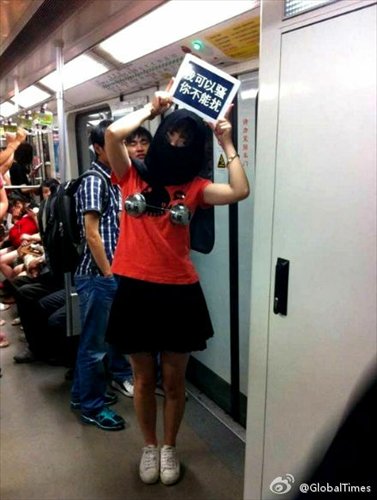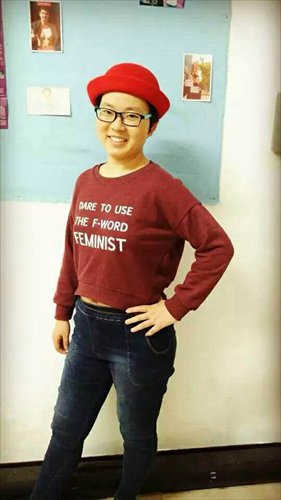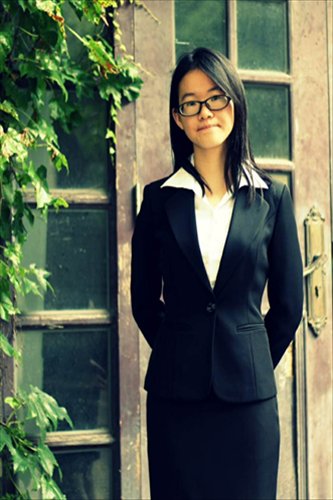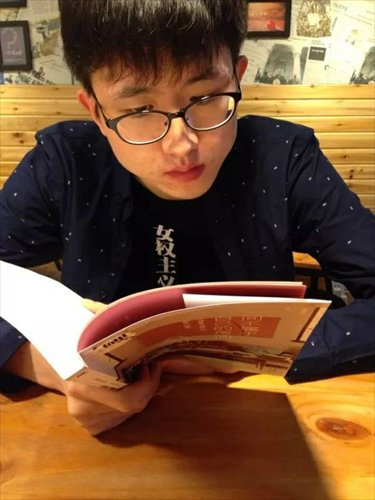Righting the wrongs
Shanghai feminists give their perspective on equality

Gender inequality continues in China. Photo: IC

On a Shanghai metro carriage a woman holds a sign: "Just because I'm slutty doesn't mean you can be dirty." Photo: Internet
For thousands of years, women in Confucianist ancient China were constantly regarded as inferior to men. They had little access to education, could not work for the government or marry more than one person - as men could. They were never regarded as independent people but as chattels of their parents or husbands.
Things changed when the feudal society came to an end and the People's Republic of China was established in 1949. Chairman Mao Zedong's famous quotation that, women hold up half the sky, became a political slogan used to encourage females to take up heavy manual labor in factories and on farms. In the 1950s and 1960s, during New China's initial economic construction period, millions of Chinese women undertook all sorts of public welfare work alongside looking after their families.
As a result, at that time women in China enjoyed a relatively high status. Gender equality was written into the constitution, and women were given the same rights as men for education and employment. And when authorities began enforcing the one-child policy in the early 1970s, the government tried to persuade families with one daughter to forget giving birth to a son by promoting slogans like "girls are as good as boys."
However, despite the official efforts gender inequality continues to thrive in China. Although, for example, paid maternity leave was seen as a move to give women more equality, many employers these days are reluctant to hire married women with no babies.
Discrimination against women is more obvious when it comes to sex. Many people still believe that victims (women) should be blamed for sexual assaults rather than the male offenders. To avoid sexual harassment, many parents and teachers remind girls to wear discreet clothes and behave "properly" in public but boys are rarely taught about respecting women.
In 1995, the Fourth World Conference on Women was held in China and from then on, feminist movements gradually emerged across the country, with a growing number of Chinese feminists publicly calling for gender equality. In 2012, two feminist movement activists in Shanghai protested on the metro system with a sign that read "Just because I'm slutty doesn't mean you can be dirty." This was in response to the metro operator's public criticism of a woman passenger who wore a see-through black dress. "It's no wonder that some people get harassed if they dress like this," the metro operator said on its official Weibo account.
The Global Times talked to six local feminists who shared their experiences and thoughts.

Wu Xiaoyan, 34, culture researcher
Three years ago, a friend and I stood on the metro with the sign "Just because I'm slutty doesn't mean you can be dirty," to protest against the society's connivance in sexual harassment. I think it was a successful event which attracted media and public attention.
The year 2012 was described by some Chinese media as "the first year of China's feminist movement era," when many activists began publicly calling for women's rights. I know some of them and I appreciated their courage. I was astonished to learn they had been arrested - I thought they were very moderate.
Years ago when I was studying in Fudan University, I took part in the play The Vagina Monologues, which was adapted from American writer Eve Ensler's play. In the play we talked about painful periods which at least 70 percent of the women I knew suffered from but neither organizations nor individuals had ever told us how to cope with. To tell the men in the audience how this felt we said: "Imagine how painful it is if someone steps on your penis with a high-heeled shoe."
In the play we also talked about abortion, sex workers and sexual harassment. I've met a lot of women who felt guilty after being sexually harassed - they kept reproaching themselves for wearing "sexy" clothes or hanging out at night. I used to blame myself like this but by being in the play I realized that I was not the one to be blamed.
The play is still staged at Fudan every year. I hope it raises public awareness about gender discrimination, though it is not as obvious as it was in ancient times.

Huang Rong (pseudonym), 24, freelancer
When I was young, my mother always blamed me for hanging around the streets or playing with other kids late at nights, but she never criticized my brother who is one year younger for doing this. I was confused: why there were lots of restrictions on girls, while boys were allowed to do almost whatever they wanted? I was also confused about why my mother had to do lots of housework but my father seldom did any.
Confusions like these inspired me to learn about the gender inequality in Chinese society, which led me to become a feminist. I agree with the concepts of postmodern feminism, that the definitions of "male" and "female" are not that important, and even dividing humans based on their gender is unnecessary.
I believe that there are few differences between men and women - I think women can also do well in the fields that the public usually regards as "male dominated" like heavy engineering, IT and the military. But sadly women are often discriminated against when they try to find a job in these fields.
Last summer I applied for a job with a Zhejiang company which only recruited males and it turned me down. I took the company to court and I won the case, collecting 2,000 yuan ($312) in compensation.
Things have not improved however. Companies that only hire men can be found everywhere and that makes me disappointed and angry.

Li Kunmei, 19, college student
Studying social work at the East China University of Political Science and Law, I often discuss feminism with my lecturers and classmates. I mostly agree with the concepts of relatively moderate Marxist feminism, which doesn't hold that males and females are necessarily antagonistic.
For example, I believe that it's not bad for women to do the housework - as long as they get paid by their husbands for this. Sadly, women in Chinese families seem to be obliged to do housework for free.
I don't think that women's status today is higher than in the olden days. The oppressions that Chinese women suffer at present are more covert than before: for instance, the derogatory term "leftover women" was created to pressure unmarried women to marry and give birth. Ironically, this insulting terminology was backed in 2007 by the All-China Women's Federation.
The word "feminist" itself has become a bad term as well: for many of the public it is a symbol of horrible and aggressive women. In recent years, there's a new term - "cancer feminist" which equates feminists with cancer patients. If you say you're a feminist, people won't want to talk to you.
Chen, 25, restaurant waitress
I was born into a big family in Jiangsu Province. I have three older sisters. After I was born, my parents, who were then working in Shanghai, sent me to a local family to be raised. They only wanted a son.
Now I live with my foster parents in Shanghai. Similarly, they prefer their son to me. My experiences have driven me to become a feminist, because I believe that men and women should be equal.
But none of the people around me think this. Recently a friend of mine sobbed to me that her boyfriend wouldn't allow her to go to her company's parties, because "women should stay at home and never go out after work." But the man himself goes to parties.
Though my friend was unhappy about this she's not angry with him. She always obeys him and believes women must agree with their husbands or boyfriends.
I've seen lots of domestic violence. Seventy percent of the women who are abused choose to grin and bear it instead of seeking legal help. Some of my friends complain quietly to me, but they never listen to my suggestions or take their husbands to court. One of my friends told her husband what I had said and he forbade her from seeing me again.
I'm by myself here. None of the people around me know about feminism, nor do they understand me.
Selina She, 31, Internet company marketing consultant
I first learned about feminism at university 10 years ago. My major was sociology, and my then tutor taught me about feminism. I agree with Marxist feminism, which asserts that the poor economic conditions of women lead to their oppression.
Women get little financial support from the government when they give birth to or raise a baby, and have to continue working during pregnancy, or while, breast-feeding to make a living, or stay at home and depend financially on their husbands. I think that lots of women who choose the latter are looked down on by their husbands and in-laws, and live unhappy lives.
Married women have to sacrifice a lot of time and energy to do housework and raise the children, but these sacrifices are not respected by their families or by society. In China, being a housewife is an unpaid and humble "job."
I attended one feminist gathering in Shanghai, where we discussed whether women must be fettered by marriage. There are an increasing number of women who don't want to get married, but nowadays public opinion tends to pressure all unmarried women to marry soon. And the law even bans unmarried women from having babies.
I want the government and society to give women more understanding and support, and allow them to live the way they want.

Ji Ming (pseudonym), 24, editor
I'm a man but I'm a feminist as well. I was born into a family with a good mother and a bad father. I don't like my father, and I seldom talk to him. I also have a low opinion of men - usually men don't do anything better than women so why can they naturally enjoy lots of privileges?
I agree most with the concepts of radical feminism, and I believe that there are few differences between males and females. Women can do most of the things that men can do.
Shanghai has long been called a female-friendly city because the husbands here are famous for treating their wives well. But I don't think so. Treating one's wife well should be just the norm. This city often speaks highly of its considerate husbands, which only proves that it is still male-dominated.
I have many female friends, and many of them are feminists. I want all my female friends to live free and independent lives.
Hu Han contributed to this story